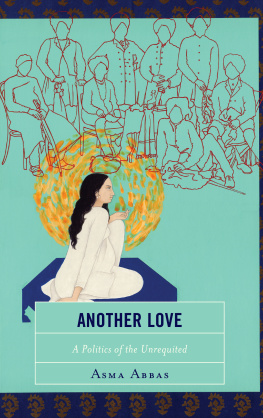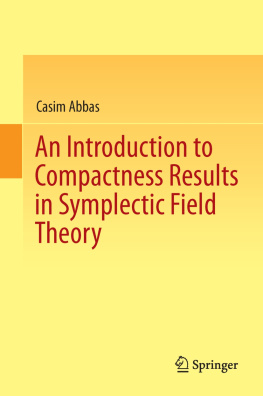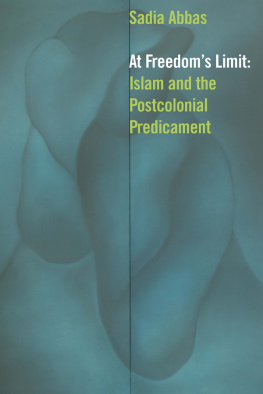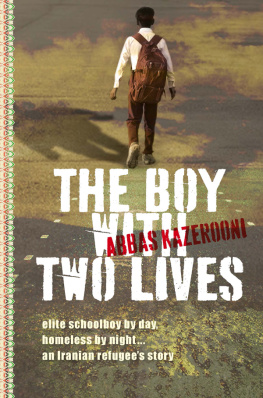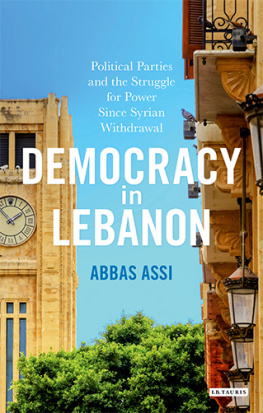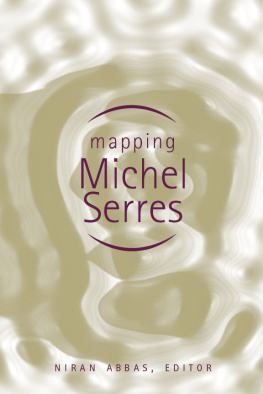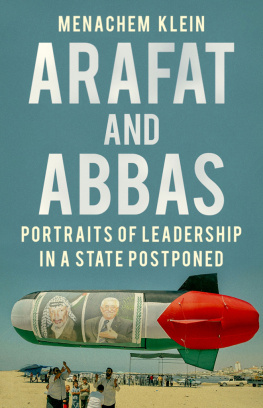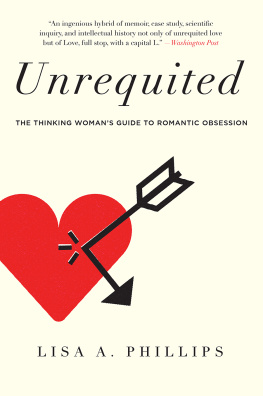Abbas - Another love: a politics of the unrequited
Here you can read online Abbas - Another love: a politics of the unrequited full text of the book (entire story) in english for free. Download pdf and epub, get meaning, cover and reviews about this ebook. City: Lanham;Boulder;New York;London, year: 2018;2012, publisher: Lexington Books, a division of Rowman & Littlefield Publishers, Inc., genre: Politics. Description of the work, (preface) as well as reviews are available. Best literature library LitArk.com created for fans of good reading and offers a wide selection of genres:
Romance novel
Science fiction
Adventure
Detective
Science
History
Home and family
Prose
Art
Politics
Computer
Non-fiction
Religion
Business
Children
Humor
Choose a favorite category and find really read worthwhile books. Enjoy immersion in the world of imagination, feel the emotions of the characters or learn something new for yourself, make an fascinating discovery.
Another love: a politics of the unrequited: summary, description and annotation
We offer to read an annotation, description, summary or preface (depends on what the author of the book "Another love: a politics of the unrequited" wrote himself). If you haven't found the necessary information about the book — write in the comments, we will try to find it.
Abbas: author's other books
Who wrote Another love: a politics of the unrequited? Find out the surname, the name of the author of the book and a list of all author's works by series.
Another love: a politics of the unrequited — read online for free the complete book (whole text) full work
Below is the text of the book, divided by pages. System saving the place of the last page read, allows you to conveniently read the book "Another love: a politics of the unrequited" online for free, without having to search again every time where you left off. Put a bookmark, and you can go to the page where you finished reading at any time.
Font size:
Interval:
Bookmark:
Another Love
Another Love
A Politics of the Unrequited
Asma Abbas
LEXINGTON BOOKS
Lanham Boulder New York London
Published by Lexington Books
An imprint of The Rowman & Littlefield Publishing Group, Inc.
4501 Forbes Boulevard, Suite 200, Lanham, Maryland 20706
www.rowman.com
6 Tinworth Street, London SE11 5AL, United Kingdom
Copyright 2018 by The Rowman & Littlefield Publishing Group, Inc.
All rights reserved. No part of this book may be reproduced in any form or by any electronic or mechanical means, including information storage and retrieval systems, without written permission from the publisher, except by a reviewer who may quote passages in a review.
British Library Cataloguing in Publication Information Available
Library of Congress Cataloging-in-Publication Data Available
ISBN 978-1-4985-7675-8 (cloth : alk. paper)
ISBN 978-1-4985-7676-5 (electronic)
 TM The paper used in this publication meets the minimum requirements of American National Standard for Information Sciences Permanence of Paper for Printed Library Materials, ANSI/NISO Z39.48-1992.
TM The paper used in this publication meets the minimum requirements of American National Standard for Information Sciences Permanence of Paper for Printed Library Materials, ANSI/NISO Z39.48-1992.
Printed in the United States of America
For the beloved who looks back
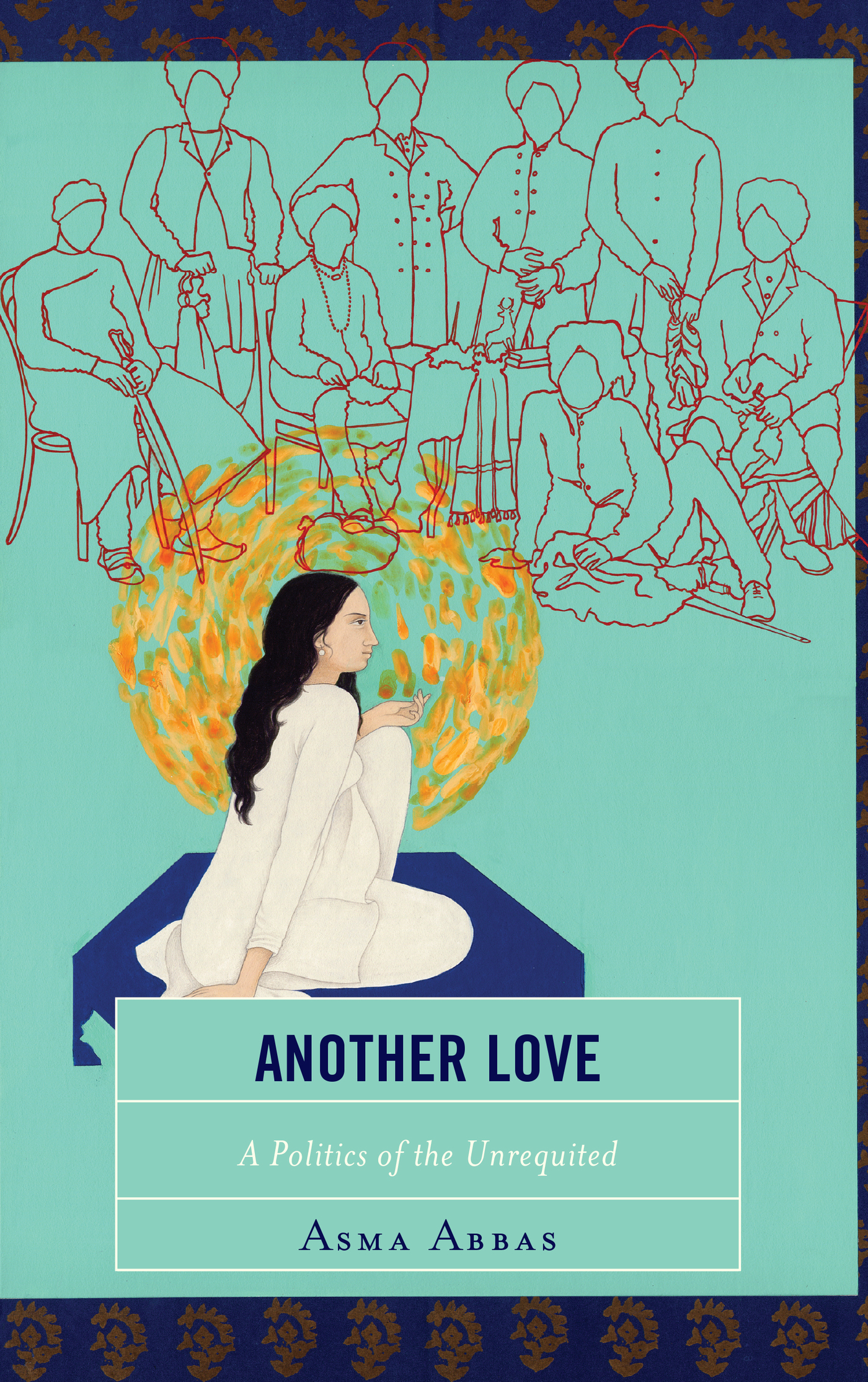
If love shifts how we experience times and spaces, where we are in time and space ought to explain why, how, what, and whom we love. And, given that most of us do not often choose where to find or lose ourselves, such love is closer to inevitability than will. Out of this banal proposition, this book irrupts, and these acknowledgments should span all those presencesmost will remain unnamed herethat lingered long enough to turn spaces into times, and times into spaces, conserving each in the name of the beloved so we might unwill some ends that have already been written.
This book was kept over many years, in many places, in many times, and in many hands. It is no ledger, for there are those whom it trusts much more than itself to keep the ledgers that allow us a chance at willed requitalswhether in Karl Marxs feverish mockery and desperate yet hopeful condemnation of capital, or in Faiz Ahmed Faizs welcoming of the Spring when accounts will be opened and questions will be asked, or in Walter Benjamins or Leela Gandhis attentive enumeration of ethical abundances drawn from within fascist and nationalist scarcities to counter curses aplenty, or yet in M. NourbeSe Philips rescuing and remaking of Zong as if we could all yet be saved. It is not a journal, because its keeper was never sure who could be trusted with the litany of unrequitedness, and because unpossession has always seemed more tempting than records of experience as possession. Maybe, then, it is an attempt at imagining which books are, could, or should be kept, by someone who is more groundskeeper than accountant or archivist. In defiance of the law of value, it invokes rather than invoices, sits next to or behind rather than across, stands near without claiming, records but only to give repose to all it has room forincluding flowers and photos pressed between pages, receipts repurposed for scribbles, remnants of gota to mark ones place, and the music that sneaks up to make sure we never run out of the little languages only lovers use.
The key site where the book was kept is Bard College at Simon's Rock, in the spaces of study, thought, construction, preservation, transformation, defense, imagination, reaction, creativity, agonism, exhaustion, and conviviality, that I have inhabited here with everyone I have been fortunate enough to hold the door for, break bread with, travel alongside, and defer finalities on behalf of. That some of us found each other here feels, on some days, like life itself, and on other days, like sweet revenge that rights wrongs. It is here that I have found words for my labor in relation to the possibilities and limits of institutions that impress on our selves in literal and metaphoric ways: the love and hope we bring to them, and the work we must do within them, when all space we must work with is always already an aftermath of something, cut from the same cloth as other spaces of a racial settler colony are, or else we are delusional. With its relative youth and its healthy ambivalence toward the project of the imperial University, this place has a shot at unwilling the ends these inheritances script for us. That is a good enough reason to tempt muscularities of thought to depart from those virile and hubristic ones within which so many institutions stay headlocked, unconsciously and irretrievably! This has informed who I have become as a thinker, reader, and teacher, and how and why this book has been kept, beneficiary of those insurgent, burgeoning, and fugal, motions that one would never expect from a little college nestled within the overbearing stasis and settlements that the Berkshires offers to so many. Those who make this possible every day are too many to name.
I thank those guardians of this institution who have enabled, trusted, and supported big and small steps of this movement. My fellow workers who care enough to look back and hold hands when it is most necessary for the soul, and who withstand our disagreements and shared desires in the spaces we occupy together: each of you is present in these pages more than you can imagine. I honor you and am here for you as you have been for all of us.
Scott Shenkers singular generosity and grace has given life to so much within and without these pages that would have been unthinkable and unspeakable without him.
Beyond the friends and keepers who have made life possible for me, this books process also found its own home-grown interlocutors in Philip Mabry, Bernie Rodgers, Anne ODwyer, Valerie Fanarjian, Ian Bickford, Chris Coggins, Nancy Yanoshak, Wesley Brown, Gabriel Salgado, Jennifer Browdy, Brian Conolly, Sara Mugridge, Philip Shelley, Gwendolyn Hampton VanSant, Mary Anne Myers, and Brendan Mathews.
Many other spaces have held and guarded different turns of this project over the past eight years. I am grateful for the reading and writing I was invited to do at the Long Room Hub at Trinity College Dublin, the Faculty of Social Studies at Masaryk University, the Social Justice Program at Union Institute and University, the Centre for Gender Excellence at Orebro University, the Humanities Seminar at Syracuse University, the Ontario Institute for Studies in Education at University of Toronto, the Department of Comparative Literature at University of California at Irvine, the University at Albany, Bennington College, the University of Katowice, Institute of Business Administration Karachi, and the Indus Valley School of Art and Architecture. The Love in Our World Conference at the University of Manchester, the Foundations of Political Theory Workshop on Political Myth, Rhetoric, and Symbolism, the Critical Theory Workshop, and the Hic Rosa Studio in Aesthetics and Politics in Granada and in Brno, allowed me to bring my pen, paper, and books, and think with others in different welcome interruptions of life as usual. This project finally found its closure in 201718 during the sabbatical leave from Simons Rock, followed by a return to Brno (and near Ingeborg Bachmanns Vienna) as Fulbright-Masaryk Distinguished Chair in Social Studies hosted by the Department of Sociology. The Foundations of Political Theory, and the Politics, Film, and Literature sections of the American Political Science Association, the Western Political Science Association, the Association for Political Theory, and National Womens Studies Association, have made room for me to present my work, reactivate commitments to certain projects, and forge new relationships to intellectual production and academic performance. Brooklyn Institute for Social Research signals a revival of the very idea of shared projects, and I am lucky to share that space and think and teach in it. The Whitney Center for the Arts generously gave me space to write one summer. Kiran Abrar, Nada Raza, Nimra Bucha, Uzma Rathore, and Zerqa Yousuf smuggled me in and out of their homes so I could write a few half-sentences.
Next pageFont size:
Interval:
Bookmark:
Similar books «Another love: a politics of the unrequited»
Look at similar books to Another love: a politics of the unrequited. We have selected literature similar in name and meaning in the hope of providing readers with more options to find new, interesting, not yet read works.
Discussion, reviews of the book Another love: a politics of the unrequited and just readers' own opinions. Leave your comments, write what you think about the work, its meaning or the main characters. Specify what exactly you liked and what you didn't like, and why you think so.

